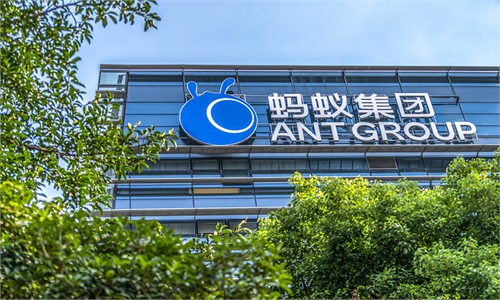Top market watchdog launches probe into online discount platform Vip.com over alleged unfair market competition acts
Regulator probes online discount business Vip.com for unfair prices

Vipshop Photo: VCG
China's top market watchdog has launched an investigation into online discount platform Vip.com over alleged unfair market competition acts - a move that analysts said sends a signal that Beijing will double down on efforts to ensure the sound development of the increasingly important internet sector, regardless of the size of a platform.
Heightened scrutiny of the country's e-commerce platforms has become a "new norm", they noted.
The State Administration for Market Regulation (SAMR)'s move was based on tip-offs, the Xinhua News Agency reported. Vip.com was founded in 2008, specializing in selling discounted handbags, cosmetics and baby-use products. It was listed on the New York Stock Exchange in 2012.
Chinese internet giant Tencent holds a considerable stake of Vip.com.
In response, Vip.com said that it will actively cooperate with the regulator's probe. Its shares shed 7.69 percent in premarket trading on Thursday.
While the SAMR did not specify the grounds for the investigation, Chinese laws and regulations usually define unfair competition as activities such as bribery, false or misleading commercial promotions, trade secret infringement, defaming competitors or forcing merchants to choose one platform from a group of competitors on the market.
The move follows anti-monopoly investigations launched against Chinese internet giant platforms including Alibaba, Tencent-backed online literature platform China Literature and express locker solutions provider Shenzhen Hive Box Co. In December, the three were fined 500,000 yuan ($76,465) each for breaching the country's Anti-monopoly Law.
China's top financial regulators have also launched a high-profile antitrust probe into Alibaba's financial arm Ant Group, after the group's dual listing in Shanghai and Hong Kong was halted in November 2020.
Vip.com itself was fined 500,000 yuan, along with bigger rivals Tmall and JD.com, for false promotions during the "Double 11" online shopping spree, on December 30.
Zhang Yi, CEO of Shenzhen-based iiMedia Research, told the Global Times on Thursday that since the fines by regulators are actually "a drop in the bucket" for the platforms, the signal that such probes send far outweighs the fining itself.
"The pressure of continued scrutiny by regulatory watchdogs means the wayward capital in China's internet economy sphere will run into a stone wall from now on," Zhang said.
The heavy-handed approach won't be restricted to Vipshop.com, and other e-commerce platforms will be subject to the same supervision, Zhang said.
China's digital economy is taking off, having already accounted for 36.2 percent of GDP as of 2019. Its sound growth is of paramount importance to the world's second-largest economy, which has adopted a "dual circulation" development pattern that emphasizes the need for the domestic market to act as the mainstay, to be supplemented by the international market.
During the tone-setting Central Economic Work Conference in December, government leaders stressed that strengthening anti-monopoly provisions and preventing disorderly expansion of capital will get rising work priority in 2021.
After a decade of rapid growth featuring more encouragement and less regulation from the government, China's e-commerce sector has grown substantially, and improper business acts could have a sizable impact on the real economy, Zhang said, noting that platforms have a tendency to engage in cut-throat competition, or, abuse their monopolistic market status.
Globally, the EU and the US are beefing up their governance of technology giants, which have an increasing influence on livelihood.
An expert in antitrust law, who commented on the matter on condition of anonymity, said that a range of laws and regulations can be applied to stop malpractices.
The expert noted that governance has been playing catch-up with a rapidly evolving sector with an annual exponential growth rate of 25 percent over the past decade. "Such a level of scrutiny is likely to be the new normal in the next phase," the expert said.
According to a commentary published on one of Xinhua's WeChat accounts, the recent probe into internet companies, ranging from digital giants that have business interests in various sectors to e-commerce platforms whose transaction volumes are relatively low, signals that all players will have to follow the same market rules regardless of their size.
The probes will exert a profound effect on the sector and play a role in guiding enterprises to undergo internal investigations, according to the commentary.
"Issues involving unfair competition have been rising, such as blocking ads online, harnessing big data to take advantage of platform members and cutting employees' welfare," said the commentary. It noted that unfair practices, which lead to market monopolies, will deprive rivals of the ability to compete and erode the foundation of a healthy economy.
While the cost of rectifying unfair competition may seem high, the "hidden cost" for society as a whole could be immeasurable, the commentary said.

